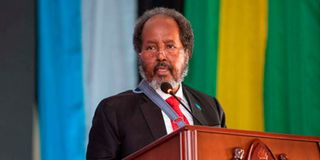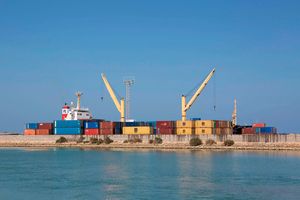
President of Somalia Hassan Sheikh Mohamud.
Somalia and Ethiopia are both, technically, very ancient nations. One was colonised. The other wasn’t. In the past, they went to war and then became allies. That explains, partly, their history.
Today, Somalia, which was colonised, got itself a 3000km coastline, now the envy of Ethiopia which wasn’t. In the past, Ethiopia had access to the sea when ports of Massawa in today’s Eritrea served its vast territory. Then they went to war and Eritrea seceded.
On Monday, Addis Ababa surprised the region after reaching a “historic” MoU with Somaliland to develop ports for the benefit of Ethiopia.
“The Memorandum of Understanding for Partnership and Cooperation, between the Federal Democratic Republic of Ethiopia (FDRE) and Somaliland, is intended to serve as a framework for the multi-sectoral partnership between the two sides,” said a dispatch from Ethiopian Prime Minister Abiy Ahmed’s office.
That MoU, it added, will help Ethiopia’s aspiration “to secure access to the sea and diversify its access to seaports.”
But Mogadishu wasn’t happy because it considers Somaliland its territory and hence only Mogadishu can sign such an arrangement. This is why President Hassan Sheikh Mohamud was on Tuesday angry while addressing a joint session of the Federal Parliament.
National sovereignty
“As a government, we have condemned and rejected the illegal infringement of Ethiopia into our national sovereignty and territorial integrity yesterday (Monday),” he said.
“Not an inch of Somalia can or will be signed away by anybody. Somalia belongs to the Somali people. This is final,” he said as he wagged his finger in the air to an audience of legislators.
The history of Somaliland's quest for ‘independence’ is long but problems started in 1991. After the fall of Siad Barre's regime in Somalia, Somalilanders announced secession from Somalia, protesting brutality meted upon their people during the civil war. No other country has ever recognised them. The Port deal was problematic because Somaliland officials claimed Ethiopia had offered to be the first country to break the ice.
Liban Yousuf Osman, Somaliland's Foreign Affairs Minister said: “The Agreement between Somaliland and FDRE is a historic strategic move for the interest of both brotherly nations.”
“Ethiopia to become the first country to recognise the Republic Somaliland in exchange of 20km access to the sea is bold step & big deal in 2024 Somaliland interest first,” he wrote on X.
Things moved first, and the Somali Cabinet declared the MoU as “null and void.”
The signed MoU allows leasing to Ethiopia a portion of the coastal area extending 20 km, facing the Gulf of Aden and the Red Sea. Some reports also indicated Somaliland may buy a stake in Ethiopian Airlines although this wasn’t in the official communique. Redwan Hussien, the National Security Advisor to Dr Abiy said the MoU is “a step in the right direction for this and generations to come.
“FDRE signed MoU with Somaliland for partnership and cooperation which paves the way for accessing a leased military base on the Red Sea,” he argued.
The Somali government has held an extraordinary meeting, condemning the move as illegitimate and recalled its ambassador.
Independent republic
Although no further details were given, the questioned MoU underlined that Ethiopia in return will recognise Somaliland as an independent republic.
Dr Abiy Ahmed isn’t the first Ethiopian leader to seek access to the sea. His predecessor Hailemariam Desalegn had raised similar controversy in 2017 after he signed a deal with Somaliland to get access to the Red Sea via the ancient Zeila’ town, nearly 2000 km northwest of the Somali capital Mogadishu.
Hailemariam said that Ethiopia would defend Somaliland if attacked. Later, when Somaliland and Ethiopia reached a port development venture with a Dubai logistics firm, Somali legislators nullified the deal. Ethiopia would change tack under Abiy, signing an MoU with Mogadishu to develop four ports. The project never picked up since 2019, largely due to distracting conflict and violence in both countries.
Yet it is not just Somalia that worries about Ethiopia’s hunger for sea access. Eritrea and Djibouti, all lying along the Red Sea raised concerns after Abiy, last year in September told an audience that “Ethiopia will secure direct access to a port, either peacefully or, if necessary, by force.”
He reiterated the urgency of Ethiopia having its own port. But he later toned it down to cooperation rather than aggression.
Mogadishu is unhappy because the port deal came up just as Somalia was re-starting dialogue with Somaliland to end their decades-long dispute on status.
President Hassan Sheikh Mohamud and Somaliland leader Muse Bihi Ahmed were in Djibouti on Thursday hosted by Djibouti President Ismail Omar Guelleh. There was no controversy on either side after Djibouti labelled Somaliland as a ‘state’. The federal nature of Somalia means there are regional states with some kind of autonomous powers, just as long as they leave foreign affairs to Mogadishu. Somaliland has often refused to federate inside Somalia and runs its own government with a central bank and military.
There are five federal states in Somalia: Jubbaland, Galmudug, Puntland, Hirshabelle and South West. All these, and Somaliland, have representatives in the federal parliament, although Hargeisa refuses to allow the federal election to be held on its territory.
Cabinet meeting
Somali Prime Minister Hamza Abdi Barre who chaired the extraordinary cabinet meeting called on Somalis not to panic.
“No inch of our land, sea and airspace cannot be violated,” stressed PM Barre.
“We have all legal means to defend our country as we had done in the past,” further indicating that there is nothing to fear.
“We should set aside our minor differences and unite to defend our country,” Barre emphasized.
Somaliland was once known as British Somaliland during colonial days. After it gained independence from the British, it waited for the southern regions then known as Italian Somaliland to get free and then united as the Somali Republic. But fissures occurred during the rule of Siad Barre who came to power in 1969 via coup. During the civil war, northern clans were targeted, fuelling their desire to quit the union. The African Union referred the secession bid back to Somalis, asking them to determine it themselves. It gave Somalia international legitimacy but hasn’t killed yet Somaliland’s desire to seek separation.
Some fear that should Ethiopia become the first to recognise Somaliland, relations between Ethiopia and Somalia, which signed a security cooperation last year, will sour. But it could also rope in interested parties, making the Horn more volatile.
For now, Somalia said it was recalling its ambassador in Addis Ababa “for consultations.”







